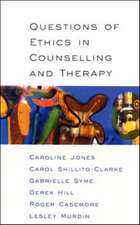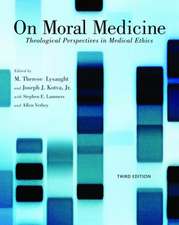The Development of Bioethics in the United States: Philosophy and Medicine, cartea 115
Editat de Jeremy R. Garrett, Fabrice Jotterand, D. Christopher Ralstonen Limba Engleză Hardback – 2 ian 2013
- Are there precise moments, events, socio-political conditions, legal cases, and/or works of scholarship to which we can trace the emergence of bioethics as a field of inquiry in the United States?
- What is the relationship between the historico-causal factors that gave birth to bioethics and the factors that sustain and encourage its continued development today?
- Is it possible and/or useful to view the history of bioethics in discrete periods with well-defined boundaries?
- If so, are there discernible forces that reveal why transitions occurred when they did? What are the key concepts that ultimately frame the field and how have they evolved and developed over time?
- Is the field of bioethics in a period of transformation into biopolitics?
Contributors include George Annas, Howard Brody, Eric J. Cassell, H. Tristram Engelhardt Jr., Edmund L. Erde, John Collins Harvey, Albert R. Jonsen, Loretta M. Kopelman, Laurence B. McCullough, Edmund D. Pellegrino, Warren T. Reich, Carson Strong, Robert M. Veatch, and Richard M. Zaner.
| Toate formatele și edițiile | Preț | Express |
|---|---|---|
| Paperback (1) | 733.61 lei 38-44 zile | |
| SPRINGER NETHERLANDS – 29 ian 2015 | 733.61 lei 38-44 zile | |
| Hardback (1) | 743.81 lei 38-44 zile | |
| SPRINGER NETHERLANDS – 2 ian 2013 | 743.81 lei 38-44 zile |
Din seria Philosophy and Medicine
- 18%
 Preț: 3071.11 lei
Preț: 3071.11 lei - 18%
 Preț: 789.52 lei
Preț: 789.52 lei - 15%
 Preț: 636.80 lei
Preț: 636.80 lei - 15%
 Preț: 643.16 lei
Preț: 643.16 lei - 15%
 Preț: 644.95 lei
Preț: 644.95 lei - 18%
 Preț: 949.23 lei
Preț: 949.23 lei - 5%
 Preț: 1154.22 lei
Preț: 1154.22 lei - 18%
 Preț: 1223.74 lei
Preț: 1223.74 lei - 15%
 Preț: 645.60 lei
Preț: 645.60 lei - 18%
 Preț: 949.23 lei
Preț: 949.23 lei - 15%
 Preț: 644.49 lei
Preț: 644.49 lei - 18%
 Preț: 948.79 lei
Preț: 948.79 lei - 24%
 Preț: 780.13 lei
Preț: 780.13 lei - 18%
 Preț: 1227.04 lei
Preț: 1227.04 lei -
 Preț: 395.85 lei
Preț: 395.85 lei - 5%
 Preț: 1103.95 lei
Preț: 1103.95 lei - 18%
 Preț: 945.30 lei
Preț: 945.30 lei - 18%
 Preț: 1383.94 lei
Preț: 1383.94 lei - 15%
 Preț: 643.34 lei
Preț: 643.34 lei - 18%
 Preț: 1130.45 lei
Preț: 1130.45 lei - 15%
 Preț: 640.55 lei
Preț: 640.55 lei - 15%
 Preț: 639.59 lei
Preț: 639.59 lei -
 Preț: 389.70 lei
Preț: 389.70 lei - 18%
 Preț: 948.61 lei
Preț: 948.61 lei - 5%
 Preț: 1092.79 lei
Preț: 1092.79 lei - 20%
 Preț: 557.46 lei
Preț: 557.46 lei - 15%
 Preț: 642.36 lei
Preț: 642.36 lei -
 Preț: 385.08 lei
Preț: 385.08 lei - 15%
 Preț: 644.95 lei
Preț: 644.95 lei
Preț: 743.81 lei
Preț vechi: 978.69 lei
-24% Nou
Puncte Express: 1116
Preț estimativ în valută:
142.34€ • 154.57$ • 119.57£
142.34€ • 154.57$ • 119.57£
Carte tipărită la comandă
Livrare economică 19-25 aprilie
Preluare comenzi: 021 569.72.76
Specificații
ISBN-13: 9789400740105
ISBN-10: 9400740107
Pagini: 288
Ilustrații: VIII, 280 p.
Dimensiuni: 155 x 235 x 21 mm
Greutate: 0.58 kg
Ediția:2013
Editura: SPRINGER NETHERLANDS
Colecția Springer
Seria Philosophy and Medicine
Locul publicării:Dordrecht, Netherlands
ISBN-10: 9400740107
Pagini: 288
Ilustrații: VIII, 280 p.
Dimensiuni: 155 x 235 x 21 mm
Greutate: 0.58 kg
Ediția:2013
Editura: SPRINGER NETHERLANDS
Colecția Springer
Seria Philosophy and Medicine
Locul publicării:Dordrecht, Netherlands
Public țintă
ResearchCuprins
Introduction.-
1. Jeremy R. Garrett, Fabrice Jotterand, and D. Christopher Ralston – “The Development of Bioethics in the United States: An Introduction”.-
Part I: The Birth of Bioethics: Historical Analysis.-
2. Eric J. Cassell – “The Beginnings of Bioethics”.-
3. Howard Brody – “Teaching at the University of Texas Medical Branch, 1971-74: Humanities, Ethics, or Both?”.-
4. John Collins Harvey – “André Hellegers, the Kennedy Institute, and the Development of Bioethics: The American-European Connection”.-
5. H.T. Engelhardt, Jr. – “Bioethics as a Liberal Catholic Heresy: Critical Reflections on the Founding of Bioethics”.-
Part II: The Nature of Bioethics: Cultural and Philosophical Analysis.-
6. Warren T. Reich – “A Corrective for Bioethical Malaise: Revisiting The Cultural Influences That Shaped the Identity of Bioethics”.-
7. George J. Annas – “American Biopolitics”.-
8. Carson Strong – “Medicine and Philosophy: The Coming Together of an Odd Couple”.-
9. Loretta M. Kopelman – “The Growth of Bioethics as a Second-Order Discipline”.-
Part III: The Practice of Bioethics: Professional Dimensions.-
10. Robert M. Veatch – “The Development of Bioethics: Bringing Physician Ethics into the Moral Consensus”.-
11. Laurence B. McCullough – “Bioethics and Professional Medical Ethics: Mapping and Managing an Uneasy Relationship”.-
12. Edmund L. Erde – “Professionalism vs. Medical Ethics in the Current Era: A Battle of Giants?”.-
Part IV: The Future of Bioethics: Looking Ahead.-
13. Richard M. Zaner – “Themes and Schemes in the Development of Bioethics in the United States”.-
14. Edmund D. Pellegrino – “Medical Ethics and Moral Philosophy in anEra of Bioethics”.-
15. Albert R. Jonsen – “Prolegomenon to any Future Bioethics”.
1. Jeremy R. Garrett, Fabrice Jotterand, and D. Christopher Ralston – “The Development of Bioethics in the United States: An Introduction”.-
Part I: The Birth of Bioethics: Historical Analysis.-
2. Eric J. Cassell – “The Beginnings of Bioethics”.-
3. Howard Brody – “Teaching at the University of Texas Medical Branch, 1971-74: Humanities, Ethics, or Both?”.-
4. John Collins Harvey – “André Hellegers, the Kennedy Institute, and the Development of Bioethics: The American-European Connection”.-
5. H.T. Engelhardt, Jr. – “Bioethics as a Liberal Catholic Heresy: Critical Reflections on the Founding of Bioethics”.-
Part II: The Nature of Bioethics: Cultural and Philosophical Analysis.-
6. Warren T. Reich – “A Corrective for Bioethical Malaise: Revisiting The Cultural Influences That Shaped the Identity of Bioethics”.-
7. George J. Annas – “American Biopolitics”.-
8. Carson Strong – “Medicine and Philosophy: The Coming Together of an Odd Couple”.-
9. Loretta M. Kopelman – “The Growth of Bioethics as a Second-Order Discipline”.-
Part III: The Practice of Bioethics: Professional Dimensions.-
10. Robert M. Veatch – “The Development of Bioethics: Bringing Physician Ethics into the Moral Consensus”.-
11. Laurence B. McCullough – “Bioethics and Professional Medical Ethics: Mapping and Managing an Uneasy Relationship”.-
12. Edmund L. Erde – “Professionalism vs. Medical Ethics in the Current Era: A Battle of Giants?”.-
Part IV: The Future of Bioethics: Looking Ahead.-
13. Richard M. Zaner – “Themes and Schemes in the Development of Bioethics in the United States”.-
14. Edmund D. Pellegrino – “Medical Ethics and Moral Philosophy in anEra of Bioethics”.-
15. Albert R. Jonsen – “Prolegomenon to any Future Bioethics”.
Recenzii
From the reviews:
“This edited book explores the past, present, and future of bioethics in the United States from cultural, philosophical, political, and professional angles. … the book will benefit bioethics scholars and advanced students. … the book is a worthwhile contribution to the literature on the development of bioethics in the United States.” (Gina M. Fullam, Doody’s Book Reviews, July, 2013)
“This edited book explores the past, present, and future of bioethics in the United States from cultural, philosophical, political, and professional angles. … the book will benefit bioethics scholars and advanced students. … the book is a worthwhile contribution to the literature on the development of bioethics in the United States.” (Gina M. Fullam, Doody’s Book Reviews, July, 2013)
Textul de pe ultima copertă
In only four decades, bioethics has transformed from a fledgling field into a complex, rapidly expanding, multidisciplinary field of inquiry and practice. Its influence can be found not only in our intellectual and biomedical institutions, but also in almost every facet of our social, cultural, and political life. This volume maps the remarkable development of bioethics in American culture, uncovering the important historical factors that brought it into existence, analyzing its cultural, philosophical, and professional dimensions, and surveying its potential future trajectories. Bringing together a collection of original essays by seminal figures in the fields of medical ethics and bioethics, it addresses such questions as the following:
- Are there precise moments, events, socio-political conditions, legal cases, and/or works of scholarship to which we can trace the emergence of bioethics as a field of inquiry in the United States?
- What is the relationship between the historico-causal factors that gave birth to bioethics and the factors that sustain and encourage its continued development today?
- Is it possible and/or useful to view the history of bioethics in discrete periods with well-defined boundaries?
- If so, are there discernible forces that reveal why transitions occurred when they did? What are the key concepts that ultimately frame the field and how have they evolved and developed over time?
- Is the field of bioethics in a period of transformation into biopolitics?
Contributors include George Annas, Howard Brody, Eric J. Cassell, H. Tristram Engelhardt Jr., Edmund L. Erde, John Collins Harvey, Albert R. Jonsen, Loretta Kopelman, Laurence B. McCullough, Edmund D. Pellegrino, Warren T. Reich, Carson Strong, Robert M. Veatch, and Richard M. Zaner.
- Are there precise moments, events, socio-political conditions, legal cases, and/or works of scholarship to which we can trace the emergence of bioethics as a field of inquiry in the United States?
- What is the relationship between the historico-causal factors that gave birth to bioethics and the factors that sustain and encourage its continued development today?
- Is it possible and/or useful to view the history of bioethics in discrete periods with well-defined boundaries?
- If so, are there discernible forces that reveal why transitions occurred when they did? What are the key concepts that ultimately frame the field and how have they evolved and developed over time?
- Is the field of bioethics in a period of transformation into biopolitics?
Contributors include George Annas, Howard Brody, Eric J. Cassell, H. Tristram Engelhardt Jr., Edmund L. Erde, John Collins Harvey, Albert R. Jonsen, Loretta Kopelman, Laurence B. McCullough, Edmund D. Pellegrino, Warren T. Reich, Carson Strong, Robert M. Veatch, and Richard M. Zaner.
Caracteristici
Contributions from seminal, first-generation figures who were at the historical center of the development of bioethics in the United States. Answers the question of whether we can we trace the emergence of bioethics as a field of inquiry in the United States to precise moments, events, socio-political conditions, legal cases, works of scholarship. Connects the historical factors in the birth of bioethics to the factors that sustain and encourage its continued development today












